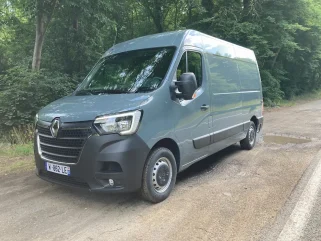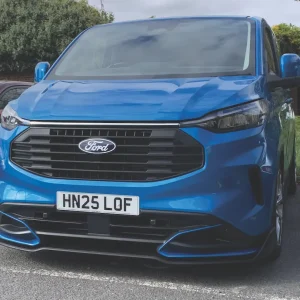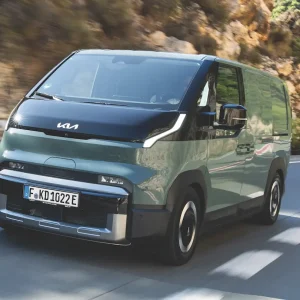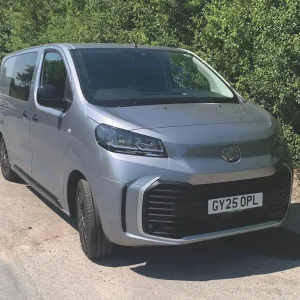
Renault first introduced an electric version of its Master large van in 2018, and it’s one of the models that has helped the manufacturer grab a leading role in LCV electrification – it was Europe’s number one eLCV manufacturer in 2021. Now, the model has been updated, with a bigger battery and therefore more range.
As before, the new powertrain comes from the Zoe, Renault’s electric city car (that has also recently spawned a commercial Zoe Van model), although it is tweaked for use in the Master. Compared with the old electric Master, battery capacity is up from 33kWh to 52kWh, allowing a driving range increase from 74 miles to 125 miles on the official WLTP cycle. In isolation this increase seems impressive, but in less encouraging news, maximum power output has remained at just 76hp, and in a large van such as the Master you have to fear that is a bit lacking.
On the road, things are better than you’d perhaps expect, but not by too much. What performance there is can likely be attributed to the powertrain’s more respectable-sounding 225Nm torque figure. Although the Master E-Tech still doesn’t offer the usual EV nippiness away from the line (we should note that a 300kg payload was in place for our test drive), performance once you’re up and running is reasonable around town, and acceleration is still just about acceptable up to the 55mph limited maximum speed – the latter feature obviously meaning extended motorway drives are not advisable.
As for the rest of the driving experience, the electric powertrain helps to make life easy for drivers with no gears to change, and great refinement thanks to the essentially soundless powertrain, though at low speeds the ethereal, Dr Who-style noise emitted to warn pedestrians of the van’s approach is fairly audible in the cab.
The steering is pretty lazy and suits a relaxed driving style, while ride quality is reasonable – it can be a bit unsettled by road surface imperfections, but there are no harsh edges.
Any drivers stepping aboard the Master E-Tech expecting a futuristic, high-tech environment to go with the electric powertrain will be disappointed. It seems a bit strange in an EV to have an old-school turn key start, and a manual handbrake. There’s no digital driver display, with traditional analogue instruments provided instead (including an overly-optimistic speedometer reading up to 150kph on our French-spec test van), and overall the cabin just feels like a less thorough job from an electric conversion point of view than, for instance, Renault’s new, smaller Kangoo E-Tech (and speaking of that model, it’s disappointing the Master doesn’t also benefit from its central rear-view mirror-replacing camera system). You do at least get an infotainment touchscreen, but it is on the small side and mounted a fair distance away from the driver, though it is usefully responsive to touches.
It sounds like we’re having a downer on the Master E-Tech overall, but let’s not be too harsh – it does everything required of it acceptably well and for an operator needing a large van for urban deliveries it will certainly do the job, while the upgraded powertrain is a clear improvement on the outgoing model. The Master E-Tech does, however, have a pretty serious problem in the form of the Ford E-Transit, which is faster (it’s easily up to motorway use), better to drive, has a nicer interior, and has a longer driving range thanks to its bigger battery. Other rivals, such as the Vauxhall Movano-e, Peugeot e-Boxer, Citroën e-Relay, and Maxus eDeliver 9, also go further between charges, and while Renault argues the Master’s range is still about twice what most of its customers need for daily operations, those rivals do therefore offer a bit more flexibility.
At the time of going to press, UK specs and prices for the new Master E-Tech were yet to be announced. However, based on our impressions so far, they will need to be impressive to make the model competitive given its relative shortcomings.
Renault Master E-Tech Electric
Price (ex. VAT) TBC
Price range (ex. VAT) TBC
Insurance group TBC
Warranty 3yrs/100,000mls (drivetrain 4yrs/100,000mls, battery 5yrs/62000mls)
Service intervals TBC
Load length 3,083mm (est)
Load width (min/max) 1,380/1,765mm (est)
Load bay height 1,894mm (est)
Load volume 10.8m3 (est)
Gross payload 1,279kg (est)
Engine size/power 76hp electric motor with 52kWh battery
Range 125mls
CO2 0g/km





